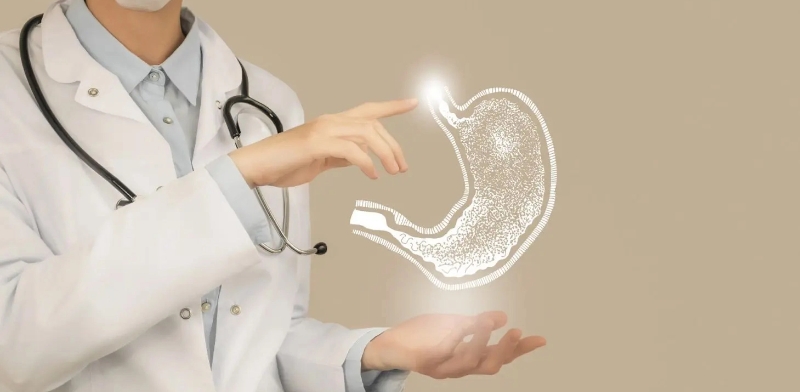What is Lorem Ipsum?
Gastric sleeve surgery, also known as a sleeve gastrectomy, involves reducing about 80% of the stomach volume with a stapling device. This is usually achieved through keyhole surgery and leaves a stomach shaped like a tube or ‘sleeve’, instead of a sack, with a capacity of about 200mls or less.
The greatest benefit the surgery offers is weight loss through restriction. Following the procedure, patients will feel satisfied after eating smaller meals and less of the hunger hormone Ghrelin is produced, which is expected to reduce many cravings or hunger signals that contribute to snacking and spontaneous food choices.
Patients may also achieve better gut health, with gut bacteria, hormones and the concentration of bile acids becoming more balanced after surgery.
Gastric sleeve surgery is the most common bariatric procedure undertaken in Australia and has been proven to contribute to significant weight loss (estimated at around 65-85% reduction in excess weight over two years) when patients follow the recommended diet afterwards.
Gastric sleeve surgery is usually a relatively straight forward procedure. Some reasons that this may be considered a better option than a bypass include being extremely obese and/ or spending time regularly away from the metropolitan centres. Ask your surgeon about the reasons for these if you would like to know more.
It is suitable for patients with irritable bowel syndrome and other conditions associated with diarrhoea as the procedure has less impact on bowel habit. Malnutrition is less of a concern in a sleeve compared with bypass.

FAQs
Most patients spend two nights in hospital following gastric sleeve surgery and are usually supported on a drip for the first 24 hours as swallowing water can be challenging due to stomach spasms. Some patients may be able to return home on the second day provided blood results and other observations are fine.
Once home, a liquid diet must be strictly followed for two weeks. Some patients may need to continue a blood thinner injection for the same period. Your surgeon will contact you after a few days to check in and will arrange to see you in the clinic about two weeks post-surgery. Our expert team will guide you through your new restrictions which include taking 4-6 smaller meals each day and not eating and drinking at the same time. Following surgery, it is also important to sip fluids constantly to avoid dehydration.
Most patients spend two nights in hospital following gastric sleeve surgery and are usually supported on a drip for the first 24 hours as swallowing water can be challenging due to stomach spasms. Some patients may be able to return home on the second day provided blood results and other observations are fine.
Once home, a liquid diet must be strictly followed for two weeks. Some patients may need to continue a blood thinner injection for the same period. Your surgeon will contact you after a few days to check in and will arrange to see you in the clinic about two weeks post-surgery. Our expert team will guide you through your new restrictions which include taking 4-6 smaller meals each day and not eating and drinking at the same time. Following surgery, it is also important to sip fluids constantly to avoid dehydration.
Most patients spend two nights in hospital following gastric sleeve surgery and are usually supported on a drip for the first 24 hours as swallowing water can be challenging due to stomach spasms. Some patients may be able to return home on the second day provided blood results and other observations are fine.
Once home, a liquid diet must be strictly followed for two weeks. Some patients may need to continue a blood thinner injection for the same period. Your surgeon will contact you after a few days to check in and will arrange to see you in the clinic about two weeks post-surgery. Our expert team will guide you through your new restrictions which include taking 4-6 smaller meals each day and not eating and drinking at the same time. Following surgery, it is also important to sip fluids constantly to avoid dehydration.
Most patients spend two nights in hospital following gastric sleeve surgery and are usually supported on a drip for the first 24 hours as swallowing water can be challenging due to stomach spasms. Some patients may be able to return home on the second day provided blood results and other observations are fine.
Once home, a liquid diet must be strictly followed for two weeks. Some patients may need to continue a blood thinner injection for the same period. Your surgeon will contact you after a few days to check in and will arrange to see you in the clinic about two weeks post-surgery. Our expert team will guide you through your new restrictions which include taking 4-6 smaller meals each day and not eating and drinking at the same time. Following surgery, it is also important to sip fluids constantly to avoid dehydration.